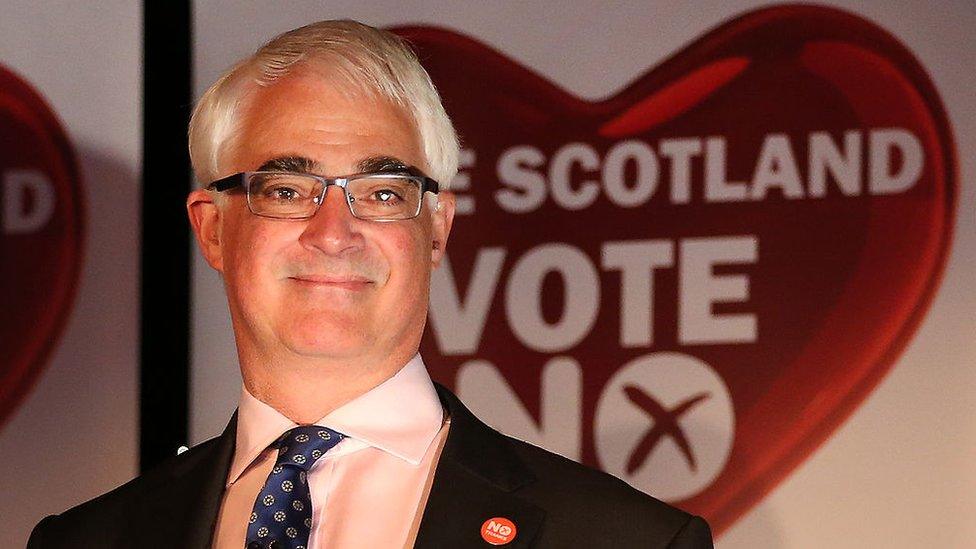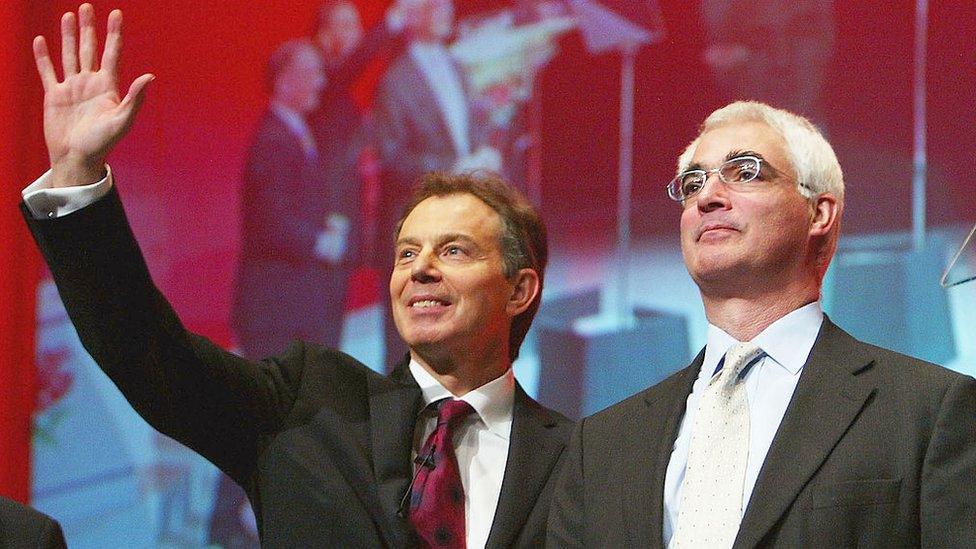Alistair Darling: 'Serious, discreet and driven by fairness'
- Published
Tributes have been paid to Alistair Darling
Alistair Darling had a reputation for possessing the most striking pair of eyebrows in Scottish politics but also the safest pair of hands.
He was an accomplished lawyer but with his sober demeanour and cautious approach he could just as easily have passed for an old-fashioned bank manager.
Last month, in what would prove to be one of his final interviews,, external Baron Darling of Roulanish described himself as "the most pessimistic person you could ever hope to meet".
It was these qualities of seriousness and discretion which propelled him, reluctantly, to the forefront of the 2014 campaign against Scottish independence.
His strategy was to suck the emotion from the debate and persuade voters to focus on their wallets — on what he saw as the risks of Scotland leaving the 300-year-old union with England.
"This is a campaign," he said, "that will make sure that the patriotism of the quiet majority will be heard alongside the voices of the committed few."
The campaign was a strange beast, encompassing the Labour party, the Conservatives and the Liberal Democrats. Formally it was called Better Together but when one aide jokingly referred to it as "Project Fear," the nickname stuck.
Whatever the name, it worked. On 18 September 2014 voters in Scotland rejected independence by 55% to 45%.

Alistair Darling led the Better Together campaign in the run up to the Scottish independence referendum in 2014
Lord Darling later described that as one of his greatest achievements, external, telling the Institute for Government that when the campaign began "there was every chance the UK would have broken up".
He had ended up leading Better Together, he once told BBC News, because no-one else wanted to do so.
"It's the old saying, he explained, "if you want something doing, do it yourself.
"I felt strongly about it. You know, I feel very strongly, as we all do, about our country. And, you know, I was damned if I was just going to see the argument go by default."
However, he later conceded that aspects of the aftermath, including the UK's decision to leave the European Union against the wishes of a majority of voters in Scotland, were a source of regret.
'Nomadic early life'
Alistair Maclean Darling was born almost exactly 70 years ago, on 28 November 1953, the eldest of four children.
His early life was "nomadic" as a result of his father's job overseeing large civil engineering projects.
He attended primary schools on Tyneside, in Yorkshire, in Grangemouth on the Firth of Forth and elsewhere before the family settled in Edinburgh, with Alistair attending the private Loretto boarding school in nearby Musselburgh and later studying law at Aberdeen University.
"I tended to have a smaller group of friends because I'm not naturally gregarious," he once wrote in an article for the Daily Mail., external
"That probably stems from having moved around so much, so I felt like an outsider."
He also revealed that his hair turned grey as a teenager, although not his distinguished, bushy, jet-black eyebrows.
The Darlings' middle-class family background was a far cry from Labour's working-class roots on Red Clydeside.
His grandfather had stood for the Liberal Party in the 1945 general election while his great-uncle was the Unionist MP, and wartime lord provost of Edinburgh, Sir William Darling.
Outlook on life
And yet Alistair Darling joined the Labour Party in 1977 because, he later recalled, external, of a sense that "the Tories were unfair. They were only for one side, and not for everyone."
"The Labour Party just seemed to reflect my outlook on life - you know, that we were better working together - fairness, helping everyone to get on, rather than just a few," he said.
In 1978, Alistair Darling qualified as a solicitor before gaining admission to the Faculty of Advocates in 1984.
After a stint on Lothian Regional Council, he was returned to Westminster as the MP for Edinburgh Central in 1987, ousting the Conservative, Sir Alexander Fletcher.
In 1986, he married the journalist Margaret Vaughan, with whom he had two children, Calum and Anna.

Mr Darling was a key figure in government during Tony Blair's time as prime minister
At Westminster, his talents on the front bench were valued by Neil Kinnock and John Smith but it was Tony Blair who promoted him to the key role of Shadow Chief Secretary to the Treasury in 1996, as Labour's long exile in opposition drew to a close.
Working in local radio in Edinburgh at the time, my colleagues and I knew he could always be relied upon for a dry and pithy quote attacking the troubled government of John Major.
So reliable and routine were his demands for investigations into alleged Tory failings that whenever any supposed scandal erupted, no matter how minor, the shout would go up in the Radio Forth newsroom: "There must be an inquiry. Call Alistair Darling!"
Understated figure
The hard work of opposition paid off and he became a key, if understated, figure as New Labour took power, serving in cabinet for 13 years under Tony Blair and Gordon Brown in a variety of posts including Chancellor of the Exchequer and Chief Secretary to the Treasury, as well as in the Trade, Scotland, Transport, and Work and Pensions ministries.
His heart, though, was in his mother Anna's native Hebrides, gazing out at the Atlantic Ocean from the family croft on Great Bernera where he was, by his own account, always at his happiest and most relaxed.
Perhaps because of that, it was here that he gave an interview which prompted one of the greatest furores of his career — his assessment that the economic crisis facing the world was "arguably the worst in 60 years".
Financial emergency
The resulting storm blew in from his own side, with his close friend, Prime Minister Gordon Brown reportedly furious but just two months later, as chancellor, Darling was indeed dealing with the worst financial emergency in living memory.
"Probably the most scary moment", he recalled, was when he took a call from the chairman of Royal Bank of Scotland (RBS) who told him that it was "haemorrhaging money."
"Remember this was not only the biggest bank in the world, it was about the same size as the entire UK economy.
"I said to him, how long can you last? And what he said to me shook me to the core. He said, 'well we're going to run out of money in the early afternoon'."
Alistair Darling was widely praised for his stewardship of the Treasury during this dramatic and difficult period.
His early assessment of the economic crisis has weathered well, along with his typically arch prediction that his own obituary would contain the epithet "a safe pair of hands."